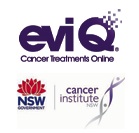Workshops
There will be four Pre-Congress workshops taking place on Thursday 25 July 2013 and these will be held at the Brisbane Convention and Exhibition Centre.
All four workshops are full day programs.
Please click on the workshops below to read more details.
Workshop 2 - Cancer Care Coordination Professional Development day: Updating this Key Role
Workshop 3 - Recent Advances in Cancer Care: a Workshop for Experienced Cancer Nurses
Workshop 4 - Cancer Basics – a workshop for nurses and allied health professionals
WORKSHOP 1
Antineoplastic Drug Administration Course (ADAC) – Facilitation Skills Training Workshop
Speakers – To be confirmed
Time – 1000 – 1645
Description
eviQEd is a Cancer Institute NSW educational program that uses eviQ content, providing cancer health professionals with online, blended courses that standardise and promote best clinical practice for the care of patients with cancer.
The Antineoplastic Drug Administration Course (ADAC) comprises elearning, face to face workshop, supervised clinical practice, competency assessment and requires skilled facilitators to support nurses through this process.
This workshop is open to nurses who are or intending to facilitate staff undertaking ADAC in their workplace. The workshop will enable attendees to actively participate in developing skills to facilitate ADAC through small group work, simulation and large group discussions. There will be plenty of opportunity to network with other colleagues implementing ADAC. The day will focus on demonstrating and learning facilitation skills (rather than didactic teaching skills) to manage the various components of ADAC.
Please note numbers are limited for this workshop to 36 participants
As numbers are limited, the following registration prerequisites apply:
- Your employing health care organisation must have implemented ADAC or has completed an ADAC Application Form
- Experienced in the administration of intravenous antineoplastic drugs
- Your employing health care organisation recognises you as a facilitator of ADAC
Workshop supported by: 
WORKSHOP 2
Cancer Care Coordination Professional Development day: Updating this Key Role
Time - 0930 – 1600
Description
This workshop will showcase a position paper developed by members of the COSA Cancer Care Coordination Interest group on the role of the cancer care coordinator. This paper aims to provide a consistent understanding of the cancer care coordinator role across Australia and acknowledges additional roles often described as care coordination. An expert multidisciplinary panel will critically discuss the content presented with the opportunity for audience input.
The second half of the day provides delegates with the opportunity to explore the practical implementation of screening tools into their clinical setting. Three presenters will begin the session discussing tools they currently use, and how they adapted the formal structure to suit their varying settings of care. Delegates will then move into smaller groups to further discuss a specific tool.
Workshop supported by: 
WORKSHOP 3
Recent Advances in Cancer Care: a Workshop for Experienced Cancer Nurses
Time - 0900 – 1630
Speakers - Professor Patsy Yates, Dr Kimberley Alexander, A/Prof Mei Krishnasamy, Mr Raymond Chan and remaining speakers TBC
Description
This workshop will feature some of the most important and exciting advances in cancer care over recent years. In the morning, topics covered will include advances in genetic pathology/ personalised cancer care, cancer-related symptom clusters and symptom management. In the afternoon, we will focus on the role of an experienced cancer nurse in developing evidence-based clinical guidelines for their local clinical area, and also updates on the development of advanced roles in cancer nursing. We hope that your learning will be facilitated using a mixture of lectures, case studies and peer discussion. We suggest that attendees should have at least 3 years of cancer nursing experience.
WORKSHOP 4
Cancer Basics – a workshop for nurses and allied health professionals
Time - 0900 – 1630
Description
All nurses and allied health professionals, regardless of their practice setting or level of experience, are required to work collaboratively with the person affected by cancer to address their health needs. Throughout the cancer journey, people affected by cancer require services in generalist settings such as general practice, diagnostic services, emergency departments and general medical / surgical services. They may have co-morbidities and may live with the consequences of cancer beyond an active diagnostic and treatment phase, in survivorship or at end of life. When in contact with people affected by cancer, all health care professionals need to be capable of meeting the health care needs of these individuals.
This workshop will provide an overview of the cancer experience and the health care responses required to meet individual’s needs including communication, psychological, social and emotional support and conceptualisation of the meaning of cancer. Clinical experts will provide an overview of the common treatment modalities.
The workshop will have interactive elements and opportunities for participants to engage with clinical experts throughout the day.
cancer nurses society of australia












